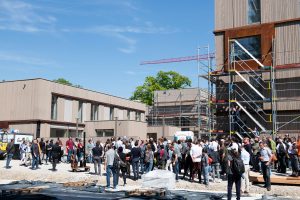At the firstn Großveranstaltung in the Grand Palais Éphémère on dem Champ–de–Mars celebrated the 10th International Timber Construction Forum FBC an appearance, dhe President himself Macron and his ministers draws attention to building with wood.
 Like never beforen at the anniversary appearance of the French Timber Construction Forum Content and packaging together. As an advertisement for timber construction, the temporary Grand Palais Ephémère for itself. In keeping with this, the Auditorium Ephémère was created especially for the Forum. made of curved CLT–Panels and the also for this issue developed Mstands "Belleville" from hardwood. Thise convincing Embedding the Message via den Change in Direction Building with renewable raw materials drew not only 6800 registered visitors to, sondern also two Minister and the President of the Republic, Macron. The intention, announced shortly thereafter, to Aid approved a year ago for the forestry– and timber sector by 100 million euros, stands unmistakably in the Context to this performance.
Like never beforen at the anniversary appearance of the French Timber Construction Forum Content and packaging together. As an advertisement for timber construction, the temporary Grand Palais Ephémère for itself. In keeping with this, the Auditorium Ephémère was created especially for the Forum. made of curved CLT–Panels and the also for this issue developed Mstands "Belleville" from hardwood. Thise convincing Embedding the Message via den Change in Direction Building with renewable raw materials drew not only 6800 registered visitors to, sondern also two Minister and the President of the Republic, Macron. The intention, announced shortly thereafter, to Aid approved a year ago for the forestry– and timber sector by 100 million euros, stands unmistakably in the Context to this performance.
Die so far last Presentation the wood industry in Paris hieß 'Paris Capitale' and transformed the Champs–Elysées in a Garden. For This event saw the industry reach far more into the Bag, as it at 10. International Holzbauforum was the case. In the area of the Wood construction leaves itself the Effect of the 10. Forums only with the Exhibition via Wooden houses compare the the Architect Roland Schweitzer 1979 at the Centre Pompidou organised. It was attended by over one million People visited and marks the beginning of modern timber construction in France.
A future for us all
For the Organiser of the Forums was it important, the Industry effective to present, um dhe current Often medial Mood against Wood processing to invalidate. So came it to unique Designing a concept for low-emission Events with the help of wood. "Réservez un futur": "A future reserve“! An important Strategic approach: The Emissions of the Trade fair presentation to reduceen through Renunciation, Repurposing and Recourse at renewable Building materials. The Forum waived at Carpeting, set Wooden tables an, the aus the Doors of a dissolved Paris hospital created are, and developed new flexible Trade fair facilitiesmade of wood.
emission, compensation and perception of the "Ecologically designed timber construction" forum.
Go to second Part the Strategy belongs the Investigation of the Life cycle of a Timber Construction Forum and the Calculation the emissions of the 10th Forum. This Analysis helps den Organisern, next steps towards emissions neutrality. What is considered emissions still remain is determined by the Planting ar own designated Forest plot in Epinal/Nancy France compensated. All Parttaker have the Possibility, a Seedling for 6 Euro to Buy In this Case went it at the New planting a two Hectare large Plot north of Nancy with larches and Atlas cedars.
Thematically structured exhibition on the subject of timber construction
This approach had a consistent and invigorating effect on the visitors. The "Belleville" booths were attached to the Veranstaltion specialists GL Events sells, and the Auditorium interested the Organisers of the 2024 Olympic Games in Paris for further use. The amalgamation the calculation of emissions and their compensaation through the Congress participant was received with goodwill and enthusiasm within the industry. After all, von originally estimated 2000 trees for 2000 congress participants/Inside a little more than 1300 sells become. Whereby some Visitors/Inside to to 150 Trees ordered. The Minister of Agriculture Julien Denormandie reached for his wallet during the passageonnaie and
bought five seedlings, which he planted on die baptised the names of his children.
The conference programme is available
Even more important was thee media impact of the concept "Réservez un futur". More than 400 articles appeared in the general press about the Veranstaltung. With this, the Forum made a huge leap into the public eye, and this also applies to all other events of the
Timber Construction Forum. Above all, however, timber construction finally showed itself from a side that Challenges due to collectionwithstands the test of time. The 10th Forum truly ushered in a new era, provided that the French timber industry to take advantage of this historic opportunity toß.
First Nagelprobe will in September implement the government's long announced and now The "Assises de la forêt et du bois" (forestry and timber assemblies) were– and timber industry). There the distribution of the additional money that has been promised.enbut only if the industry is willing to is to finally pull together. How this can succeedn, has the 10th Forum single-handedly impressively demonstrated.
Whoever is looking forward to this important Prepare meeting would like, can view the entire records of the Conferences for six Rent months:
https://vimeo.com/ondemand/forumboisconstruction21
Until now, only the printed summaries were available for this within the framework of the timber construction forums. Also forward-looking is the first-time Live–Fromsthe conferences during the Forum. In French–Guyana and Canada made use of it. In this way the Timber construction forums to globaln Events. Their impact in promoting timber construction is growing.
Epinal–Nancy from 6 to 8 April 2022
The next International Timber Construction Forum finds from 6 to 8 April 2022 in Épinal–Nancy instead of.
Keywords:








